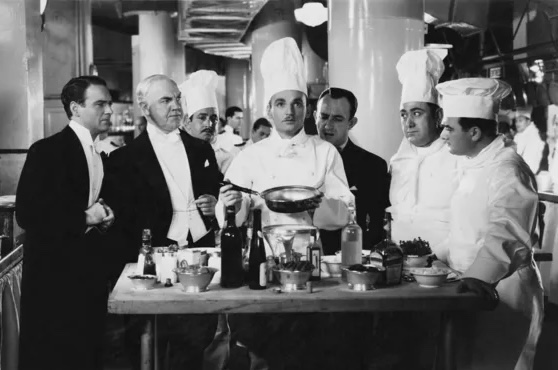I always laugh at the latest bout of performative outrage over celebrities abusing the staff at restaurants, as James Corden allegedly did at Balthazar this week. Not because I think it’s funny, because of course it isn’t, but as a former server I know this entitled behavior is quite common in restaurants. If you haven’t read the news yet, Corden apparently dressed down the staff at Keith McNally’s Manhattan bistro when several mistakes were made preparing with his wife’s bespoke “egg-yolk only” omelette with Gruyère. Reports claim that Corden repeatedly admonished his servers, yelling insults like: “You can’t do your job!” and “Maybe I should go into the kitchen and cook my omelette myself?”
The situation called to mind a similar row involving “Iron Chef” Cat Cora back in 2019 when Cora was accused of going ballistic and flipping off the hostess at Chicago’s Alinea after she was refused a table (even though her party arrived without a reservation). Cora vehemently denied the allegations until the owner Nick Kokonas released surveillance tapes that showed her getting aggressive with the staff. Like McNally, Kokonas used social media as a bullhorn to air his grievances and the food media, as they always do, worked themselves into a froth about it for weeks.
The most amusing part of it to me was that restaurateurs like McNally train their staff to be docile when guests become ornery, like Corden did. It’s generally unacceptable for servers to speak up for themselves when customers talk down to them. I’ve had many coworkers lose their jobs for talking back even though they were clearly justified in doing so. The prevailing wisdom in hospitality circles is that nothing good can come from challenging the primacy of the guest’s needs. That leaves staff impotent in situations like this and vulnerable to being abused by people like Corden who get aroused by the power dynamics. It happens everyday restaurants. The perpetrators forget, but the servers don’t. These situations live on in their restaurant nightmares for years.
One inalienable truth about the Corden and Cora situations is that the people who deserve an apology, the staff, rarely get one. Lost in the posturing and Instagram shaming is that a group of hard-working and likely exhausted restaurant workers were trying their best to make these people happy. No one was conspiring to hijack Corden’s leisurely lunch. There wasn’t a vindictive line cook who prefers Jimmy Kimmel purposefully slipping traces of egg white into Mr. Corden’s wife’s omelette. The cooks probably separated the whites from the yolks to order which—especially during a crazy busy Balathazar service—isn’t easy to do without flaw.

Every restaurant I’ve ever worked in over the twenty-year span of my career has had guests, often regulars, that mistreat staff. Rarely are these individuals refused service or asked to raise the standards of their behavior. Instead, restaurant workers are conditioned to hold their tongues and “kill them with kindness.” Unfortunately, we end up killing ourselves, on the inside, when we’re repeatedly asked to administer triage to aggrieved guests who have no legitimate grievances.
The Corden situation, trivial though it is, should remind us that we need to re-examine the lob-sided power dynamic inherent to hospitality. The fallout from the pandemic has exposed how the old rules of engagement have become a hindrance to recruiting talent. The labor shortage is at least partially born out of the fact that former restaurant workers are tired of cowering to undeserving rich people like Corden, especially when doing so puts their health at risk. If hungry people want restaurants to be able to find adequate staff, they need to accept a new framework for how they should behave when they dine in them. Allowing James Cordens to throw hissy fits like Veruca Salt from Willy Wonka and the Chocolate Factory every time there’s a mistake in their order is simply unsustainable.
Within less than twenty-four hours, Corden apologized to McNally personally, and his ban was reversed. Unsurprisingly, there were no reports of Corden directly apologizing to the staff he’d abused. I wonder if the staff would be so charitable about allowing Corden back into the restaurant if they were given a say. My guess is they wouldn’t, because they’d rather that table be occupied by someone with a good conscience and a clean diaper. To an owner, faceless tables represent naked sales. They just want the seats full. To staff, on the other hand, how the occupants of each table comport themselves can dramatically affect the tenor of their night.
The fact is that most restaurant workers don’t have time to dwell on the James Cordens of the world. Our sanity is challenged every night by guests’ outlandish behavior, and it always exceeds our wildest imagination. “You can’t make this shit up” is one of the most common phrases uttered behind the curtain of every restaurant. We maintain sanity by filtering out the impurities and assuring ourselves that it’s not us, it’s them. There will always be another James Corden, and we’re better off saving our energy for the next battle than wasting our breath on carpool karaoke. Plus, the rent is due, and we probably have to work a double tomorrow.


